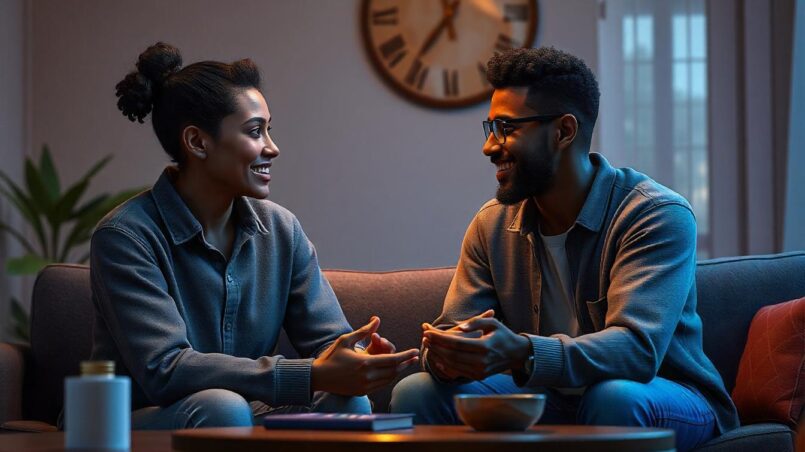How to communicate effectively in a relationship is one of the most critical skills couples can develop. Communication goes beyond the interaction of exchanging words, It involves understanding with a feeling as if you are in their shoes. As we immerse ourselves into the busy world where social media and other stimulants are flooding our lives, most couples struggle to maintain emotional connection and their communication often lacks eye-to-eye contact. This blog delves into practical ways to improve the extent and quality of the communication between you two to improve the relationship, hence making it healthy.
Table of Contents
Understanding the Importance of Communication in Relationships
In any interpersonal relationship, interaction plays a central issue. It enables partners to do the following: say how they feel, sort out any disagreements they have, and develop trust on their side. When discussing how to communicate effectively in a relationship, consider these key aspects:
Emotional Connection
A good flow of information creates a mutual emotional connection of the two individuals. When people make their emotions public, this kind of interaction invites people to be vulnerable and open, and in turn intimate. Such rapport would add a sort of intimacy into the marriage and can make both partners feel wanted as well as appreciated.
Conflict Resolution
Clear communication can prevent misunderstandings that lead to conflicts. In this case, couples create strategies for how they can handle difficulties in proactively handling confrontational situations. Particularly, instead of quarreling, partners may play productive disagreements from which they will discuss the causes of the problems they face.
Shared Goals
Regular discussions about aspirations and goals help partners stay aligned and supportive of each other’s dreams. If both parties are in harmony, they can embrace work and find ways to attain set goals as a group in the relationship.
Tips for Effective Communication in Relationships
To communicate effectively in a relationship, consider implementing the following strategies:
1. Practice Active Listening
Active listening is one of the most critical components of how to communicate effectively in a relationship. It involves fully concentrating on what your partner is saying, rather than merely hearing their words.
- Show Engagement: Demonstrate that you are listening by maintaining eye contact, nodding, and providing verbal affirmations like “I see” or “I understand.”
- Reflect Back: Retrospectively, when your partner has come to the end of their turn you should sum up what you understood the main point of their message was. For instance, you might ask, “That is, you feel too busy with work.”
2. Be Open and Honest
A key concept that should by some reason apply to any type of the relations is transparency. It grows trust, when two partners are free with each other and share their thoughts and feelings with one another.
- Share Your Feelings: Feel free to show your feelings. Avoid using blame by expressing yourself in terms of feelings and needs, like “I feel” or “I have a need for.” For example, “When people decide to change arrangements on the last day it makes me feel so sad.”
- Avoid Withholding: When emotions are suppressed there is a build up of resentment. Make it a habit to sit down with your partner and discuss your thoughts and feelings, so that you always feel heard.
3. Use Nonverbal Communication
The other aspect of communication skills in a relationship is the ability to appreciate gestures ands. Sometimes, what you say may not even be said with your mouth because the body is also able to speak louder than words.
- Maintain Eye Contact: This shows attentiveness and sincerity. It lets your partner know that they have your full attention.
- Observe Body Language: Be aware of your partner’s nonverbal signals, as they can provide insights into their feelings. Crossed arms or averted gaze might indicate discomfort or disagreement.
4. Stay Calm and Composed
Debate from time to time gets heated because participants know that what they are discussing is the truth. Exactly for this reason it is necessary to learn how to control emotions when communicating.
- Pause Before Responding: Take a moment to breathe and think before reacting, particularly during disagreements. This can prevent emotional outbursts that might escalate the situation.
- Avoid Raising Your Voice: Keeping your tone steady and calm can foster a more constructive conversation. If things become heated, suggest taking a break and revisiting the discussion later.
5. Set Aside Time for Conversations
With tight schedules it becomes difficult to engage in Quality conversations. It is very important to spend some time with your partner regularly.
- Weekly Check-ins: Establish a routine where you sit down and discuss your feelings, needs, and relationship dynamics. This creates a dedicated space for open dialogue.
- Create a Comfortable Environment: Choose a peaceful setting free from distractions to promote open conversation. A cozy atmosphere can encourage more honest discussions.
Overcoming Communication Barriers
Though is crucial to be able to communicate in a relationship, there are measures that are hindrances to couples. Below are the ways to overcome the mentioned obstacles::
1. Identify Triggers
Understanding what triggers negative reactions can help you manage discussions better.
- Recognize Patterns: Understand which topics you keep coming back to and while speaking to people, which emotions are main drivers. It is possible to give constructive feedback about these patterns when they are recognized.
- Address Triggers Calmly:You should learn to talk to your partner about your triggers. To minimize the impact of body language during the communication, both of you should have a list of situations that trigger them.
2. Seek to Understand, Not to Win
When discussing how to communicate effectively in a relationship, it’s crucial to prioritize understanding over winning an argument.
- Avoid the Blame Game: Instead of pointing fingers, focus on finding solutions together. Framing discussions around “we” rather than “you” can shift the perspective from confrontation to collaboration.
- Emphasize Collaboration: Work as a team to resolve conflicts rather than opposing each other. This partnership approach can strengthen your bond and enhance your problem-solving abilities.
The Role of Empathy in Communication
Empathy is key to how to communicate effectively in a relationship. It involves putting yourself in your partner’s shoes to understand their perspective.
- Validate Feelings: Acknowledge your partner’s emotions, even if you don’t agree with them. For instance, if your partner feels anxious about a situation, express understanding: “I can see why that would make you feel uneasy.”
- Ask Open-Ended Questions: Deepen your partner’s communication by asking follow up questions to get them to express their opinions and emotions more fully. Rather than greeting with “how was your day?” you can try “What was the highlight of your day?”
Practicing Communication Skills Together
To enhance communication in your relationship, consider practicing these skills together:
- Role-Playing: Engage in role-playing exercises where you practice responding to various scenarios. This can help you both understand each other’s perspectives and improve your responses.
- Reading Together: Select books or articles on communication skills and discuss them together. Sharing insights can deepen your understanding of each other’s communication styles.
Conclusion
Understanding how best can the two of you talk to each other in a relationship cannot be learned in a day, or by reading a book or two. Utilizing these steps, you can build up the communication with your other half improving the mutual trust, love, and admiration. Also realize that communication is a skill with which you can always enhance and making small alterations can make a big difference in your relationship.







